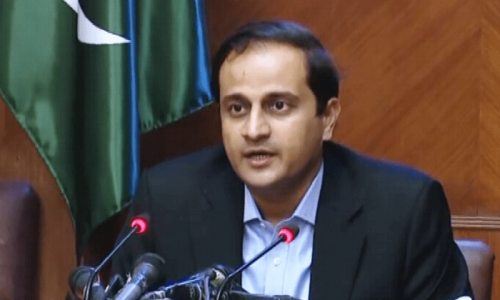KARACHI: Probably it is at the back of the readers’ minds that patients of psychiatrist Dr Hasan Manzar are re-imagined as characters in his short stories. Or rather they inquire persistently whether he writes his afsanas and novels based on problems and lives of his patients. The 81-year-old writer, however, insists he began writing stories when he was merely seven and began his career as a psychiatrist at the late age of 34. Hence, it was his medical practice that has been influenced by his writing and not the other way round.
Hasan Manzar was speaking about his works at the Anjuman Taraqqi-i-Urdu office on Saturday. The event was moderated by another doctor and writer, Dr Asif Farrukhi. Before Farrukhi began his conversation with Manzar, Fatema Hasan of the Anjuman gave a brief account of his background and writer Azra Abbas critically analysed his short story ‘Yaseen ka laal’.
Born in 1934 in Hapur, Uttar Pradesh, his real name is Syed Manzar Hasan. His family migrated to Pakistan after partition and settled in Lahore. He attended the King Edward Medical College from where he obtained his MBBS degree. Later he went to Edinburgh, Scotland, where he did his postgraduate studies in psychiatry. Working in Nigeria, Saudi Arabia and Malaysia influenced his writing lending it an unusual voice. His short stories have been compiled and published in five books, including a book of children’s stories. Currently he is working on a long play, expected to be completed and published soon.
The story ‘Yaseen ka laal’ , which “left me stunned at the creative prowess of the writer,” said Azra Abbas, who read out a paper on the story. She was so deeply moved by the character that she said she actually experienced the paths Yaseen was traversing during the course of the story.
Manzar then read out ‘Pursa’, a short story exploring the relationship dynamics of a woman, her mother and her mother-in-law following the death of her father-in-law, which was much appreciated by the audience.
Responding to a question by Farrukhi regarding his beginnings as a writer, he said he had been writing since he was a child and continued to do so during his teenage years. The turning point came when his story ‘Daashta’ was published and was appreciated.
About why was there such a long gap in his writings, Manzar said because he went away to Scotland for his studies and travelling to different countries for employment. It is only when he returned to Pakistan and settled in Hyderabad, a kind of peaceful shelter (panahgah) providing him an enabling environment for his writing.
When asked to share with the listeners praise by the likes of literary stalwarts such as Sadat Hasan Manto, Faiz Ahmed Faiz and Ahmed Nadim Qasmi, Manzar looked visibly embarrassed and said: “It isn’t appropriate to do so.” However, he did share a comment made by Quratul Ain Haider: “Once Jam Chandio, a Hyderabad-based writer, went to New Delhi and met Quratul Ain Haider. When she asked him what place he belonged to, he answered Hyderabad. ‘Ah, from the city of Hasan Manzar.’ It is a great honour for me to be remembered in this way by someone like her.” Later Farrukhi told this reporter that it was in the 1950s and Manto was present at a gathering where Manzar read out a story which Manto openly appreciated and Faiz wrote a letter to Manzar generously praising his short story ‘Rihaee’.
Upon Farrukhi’s gentle prodding to discuss his brief association with the film world and his paper on the film Devdas, Manzar said he was once invited by Shaukat Hasan Rizvi to write a screenplay which he did, but was disappointed when he was asked to incorporate a scene from a well-known Hollywood film into his screenplay. “That was my one and only foray with the film world.”
About Devdas he said the novel written by Sarat Chandra Chattopadhyay and the one made into a movie by Pramathesh Barua starring singing legend K. L. Saigal were complete opposites. “In the novel Devdas he is self-absorbed, cruel towards Parvati and it is only when she gets married that he asks her to elope. Then he turns to drinking and his dead body is eaten away by wild dogs.” This he said was a realistic portrayal as Sindh, for instance, is littered with such single-track minded individuals who have medical and law degrees but are leading aimless lives. The film on the other hand reversed the whole story and romanticised Devdas and Parvati.
Prof Sahar Ansari highlighted the humanistic aspects of Manzar. For instance he used to be in-charge of a TB hospital in Karachi, where he clamped down on corruption of the staff, who would sell off medicines meant for poor patients. He also established a small hospital in a village in Sindh. “He has never run after money.” Another interesting fact he shared about Manzar was that he, too, as Moulvi Abdul Haq was from Hapur.
Columnist and writer Zahida Hina also commented on his humanistic aspects reflected in his stories such as ‘Zameen ka nauha’, which imagines a dystopian world bereft of women.
Published in Dawn, October 11th , 2015
On a mobile phone? Get the Dawn Mobile App: Apple Store | Google Play












































Dear visitor, the comments section is undergoing an overhaul and will return soon.